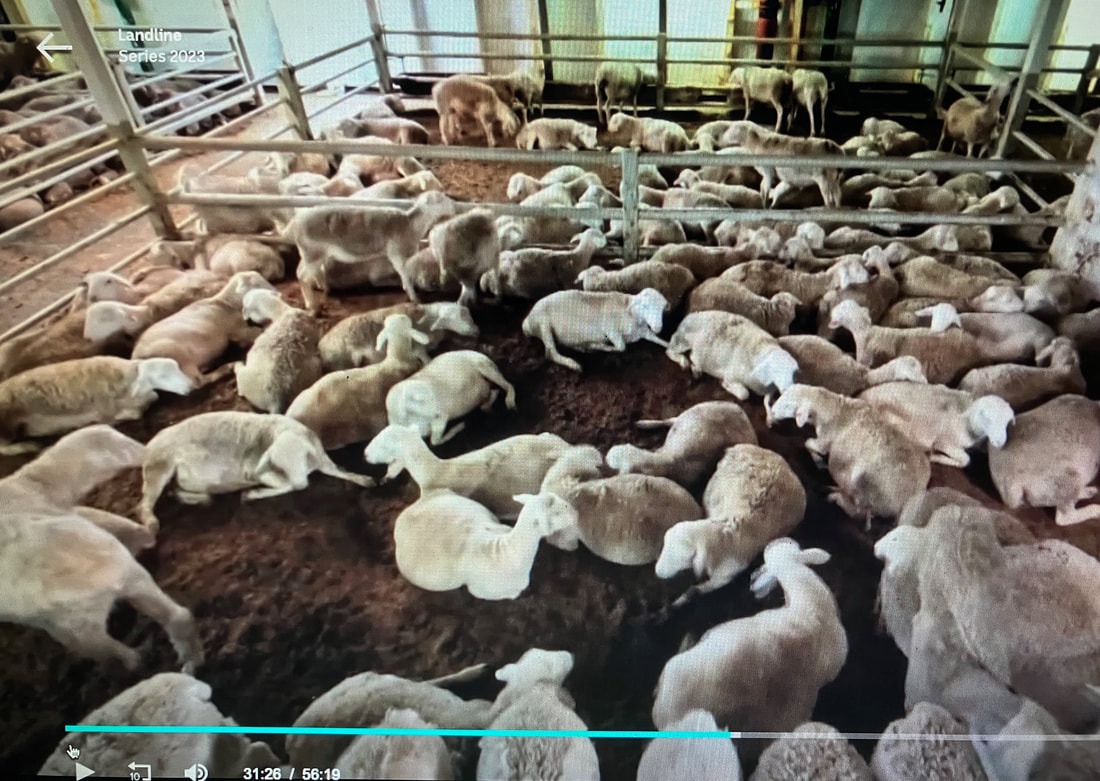|
For this segment, we check previous statements by industry to the ABC just post the Awassi disaster (May 2018) and before the impact of the increased space allowance and the NHS prohibition periods were clearly evident. VALE compares them to the data evident on the Landline footage.
1. "It's a rare move in an industry which usually hides from the cameras and shows just how desperate the trade is to claw back a social licence" This sentiment is echoed almost verbatim by Mark Bennett in Landline re an industry which usually hides from the cameras. With the threat of phaseout, the industry is again desperate to gain social licence. It seems ABC is allowed access whenever the industry is under threat. 2. "Some groups, including Vets Against Live Exports, have called for a ban on sheep exports during the northern summer." Indeed VALE did, along with calling for increased space allowance, and the call was heeded by the Government and go figure, the voyage mortality decreased drastically! 3. "Mr Daws told the ABC a seasonal ban "would not be a viable proposition..I think the business would close completely and farmers would be selling their farms." Yet this didnt happen and now farmers and exporters are clinging onto what was threatened to be a non-viable proposition. Similar scaremongering it seems to the current scaremongering that farmers will go broke if there is a complete phaseout of sheep export. 4."Dr Colin Scrivener is the ship's veterinarian. He has a big job. He's the only health and welfare officer on board for all 68,000 sheep." How is it that with the post Awassi "new" space allowances, the Al Messilah could carry 68000 sheep in 2018 in May but only had 59000 for Mark Bennetts mid-winter voyage in 2023. Was the 'ABC voyage' a special show-voyage for the cameras or were there different classes of sheep? Surely, the ABC should have probed this knowing previous stock carrying rates on this same ship as documented by their own reporters. 5."But the Awassi Express deaths were not isolated.Two years ago, this ship — the Al Messilah — lost 3,000 sheep. "No, there's not a pattern there at all," Mr Daws said." No pattern? Just no high mortality voyages on this ship now for 8 years compared to the 8 years prior to May 2018. And, that despite a decreased acceptable mortality limit (2% to 1%). 6. "With 17.5 per cent less sheep on board this voyage, they'll get a little more. "It's a very generous space allocation," Mr Daws said." For the ABC voyage, the ship had 9000 less sheep despite carrying smaller lambs. Was this an even more generous space allocation? For the cameras? 7."They don't have the same personal space problem that humans have," he said. If anyone looks at sheep in a paddock or on the banks of a dam, they lie on each other — that's the way they behave." Compare this comment to the photo taken on the Landline voyage which shows that when sheep do have increased space (see below) , they dont actually lie on each other. Some bunching can always occur as these sheep are have to find favourable spots eg better ventilation, away from the troughs etc. The bottom line is that improvement in animal welfare has come about due to animal welfare groups and not industry. None of these improvements would have been possible if left to industry. They occurred because of a Pakistani seaman, Animals Australia, 60 Minutes, diligent work by VALE, RSPCA and others in the welfare space PLUS the Australian public. The Australian public is right to continue to have concerns about this industry which has consistently denied or glossed over animal welfare concerns. What a shame Landline didnt analyse more closely....maybe the ABC can show a little less positive industry bias in their upcoming programs. Bring back Dominique Schwartz perhaps?
0 Comments
Your comment will be posted after it is approved.
Leave a Reply. |
Archives
June 2024
Categories |

 RSS Feed
RSS Feed
